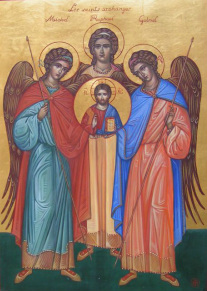 September 29 is the feast of the Archangels Michael, Gabriel, and Raphael. It is actually my feast day given that my name is Michele, a form of the name Michael. It is a feast I really enjoy because I love being named for an archangel. But it is not only because of my name that I like this feast. It is because the angels are creatures of God whose sole purpose is to serve the Lord and to protect us. They are very beautiful, important creatures! I was not very impressed by angels until I was on a 30 day retreat in September many years ago and was enlightened about what angels really are while at Mass one day. During my retreat I attended Mass every day at a lovely parish in Swissvale, PA, (a section of Pittsburgh). There was a visiting priest who said Mass on the Feast of the Archangels and he changed both my perception and appreciation for my patron forever. He said, "Since angels are neither male nor female for all we know St. Michael was actually St. Michele." I was immediately sold! I know that is not a good reason for being attracted to a patron, and I do realize he was being a bit flippant while in fact teaching a truth about the angels who do not have a gender. But it did catch my attention. It began a new-found understanding and appreciation of what angels actually are and what they do for us. Unfortunately the New Age movement and all sorts of other secular trends have trivialized angels. We see them everywhere it seems: gift stores, card stores, book stores, misrepresented in movies, and the like. These secular and quasi-religious trends have given many of us the wrong idea about angels. They are not cute and cuddly like naked babies with wings, and they are not something bordering on science fictional or superstitious. They are not people who died and were so good that they were given wings, such as we see in the movies. (Those are saints, by the way.) Angels are spiritual beings who have free will and intelligence. They have no gender since they do not need to procreate. They are pure spirit; that is, they have no corporeal bodies as we do. The word angel means "messenger" in Hebrew and that is one of their roles. They are God's messengers. Throughout the Old Testament there are numerous instances of angels acting as such. Most of the time when God seems to be speaking in the Old Testament it was really one of His angels who delivered the message for Him. They are described in many instances and we know that Jewish tradition (in addition to the Old Testament) teaches that there are many types of angels, all of whom were created at the beginning of time. They were given the same gift of free will as humans eventually received. The tradition teaches that when one high ranking angel, Lucifer, (the angel of Light) rebelled, refusing to serve any longer, some angels took up with him and rejected God. These left Heaven as fallen angels and their leader is referred to as Satan, which comes from a Hebrew word which means "an adversary; one who opposes God." The angels made their choice and it is sealed for eternity. Therefore the angels who serve God, while still maintaining their free will, are close to God and therefore will ever remain faithful. The tradition teaches us that there are nine choirs of angels. In order, they are Seraphim, Cherubim, Thrones, Dominions, Virtues, Powers, Principalities, Archangels, and Angels. (See http://www.catholic.org/saints/angels/angelchoir.php for information and a description of each type of angel.) In the Scriptures the three named archangels celebrated on this feast day are Michael, Gabriel, and Raphael. Michael means "who is like God?" and it refers to his single minded service of God whom he glorifies through his service at the head of the Heavenly Host of Angels. He is the protector of God's people. Gabriel is the messenger who delivers important messages and who announced the coming of St. John the Baptist to Zechariah and the Son of God to Mary, His mother. The third archangel is Raphael who brings healing, and is described in the book of Tobit for helping Tobit and a woman named Sarah, both of whom needed serious healing. I think it is important to note that the New Testament also tells us of angels, both good and bad. Jesus was ministered by angels after He was tempted in the desert and also He was comforted by an angel in the Garden of Gethsemane. (He also cast out demons, so we know that He attested to those types of angels as well.) Angels are important to us because they protect us and come to our aid when we need their help. They are compassionate and loving, serving our God who is Love. The Catechism tells us that each person has a guardian angel. Therefore it is important to ask for their protection when we think we may especially need it, and it is important to say thank you when we have come to the conclusion of whatever situation safely. Often when someone has done an especially good or heroic deed people will say "what an angel" or something like that. We can indeed imitate the angels by being thoughtful towards the needs of others, by serving quietly and humbly, and by being "other-centered." Maybe the Holy Spirit is motivating us and an angel is carrying that message to us, so we can act like an angel. Either way, angels are all around us, protecting us and attempting to give us the message that we are very loved by God. While angels are important, we are still the most important beings God has created; He has given us angels to try to help us to be protected and aided in times of trouble. Let us call upon the angels and archangels when we are in need of guidance or protection. Let us be especially grateful for the power of St. Michael the Archangel who is the one who leads the Heavenly hosts against the powers of evil. Let us be mindful of the messages delivered by St. Gabriel that brought about our salvation, and of the healing power of St. Raphael who delivers God's healing touch to us. Finally, let us give thanks to God for the wonders of the spiritual world He created which help us to stay with Him and return to Him at the end of our lives. Let us meet in the Heart of our Lord, along with the angels and saints. Peace! (By the way, a note about what seems to be a contradiction in what I have written about angels and in my comment about saints above: Angels are not really saints according to definition. A saint is a holy person who is now in Heaven with God. Angels were never human. But we traditionally call Michael the Archangel, for example, St. Michael as a sign of honor for his closeness to God and his role in salvation history and the same for the other two archangels mentioned. This is not true of any other angels.) 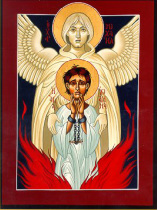 To the left is one of my favorite icons because it is of St. Michael, my name patron, and St. Joan of Arc who I chose as my patron when I received Confirmation. It depicts St. Joan of Arc dying at the stake under the protection of St. Michael the Archangel who seems to be giving her courage and spiritual protection, and who no doubt whisked her soul to Heaven. The iconographer is Rev. William Hart McNichols and this image can be found at http://www.standreirublevicons.com/gallery.php?action=viewPicture&id=369 Some other sources about angels are the Summa Theologica of St. Thomas Aquinas and The Catechism of the Catholic Church . A book I find very helpful is Angels (And Demons) by Peter Kreeft. It is in question and answer format, but he synthesizes much of the wisdom of Aquinas and other spiritual masters into his writing.  I have to admit, I have always loved to gaze at the night sky. I love planetariums and have been in love with going to them since I first went to the Hayden Planetarium in NY when I was a little girl. No offense to anyone, but I still think the Hayden is the best planetarium in the world. As the saying goes, "Your first love is your truest!" Seriously, the love I have is really for the gift of creation and for the incredible cosmos that the Lord has created, which of course stems from my love of the God of All Creation. Recently I was viewing a picture of part of the universe: it was a NASA photo of one of the nebulae. It stirred me to my core just seeing the immensity of space and all the stars, realizing that our little planet is smaller than a speck in the grand scheme of creation. Shortly after that, I took a trip to New Mexico and at one point was outside the house of a friend who lives in a valley away from any city lights. When I looked up and saw the sky, it took my breath away. I saw the Milky Way, and it is indeed “milky” with stars! It was so vivid! There were stars everywhere, and God made sure I had a good show, because He provided a shooting star (or two!) I have not seen the sky like that in years because I live in a big city. There is too much "light pollution" which truly hides the rest of the universe from sight, except a planet or two and a few really bright stars from time to time. Much as I love planetariums, even the Hayden cannot compete with the real thing. God really created something awe-inspiring and incomprehensible. Yet it can be appreciated if we take the time to look. The universe is vast. It is not something we can fully grasp in its magnitude. If we even attempt to take the reality of it in, we are overwhelmed. Yet we know it is there and it does not seem to have an end. We know that it is growing, which seems like an oxymoron: how can it be growing if it has no end? Can infinity grow? I suppose the mathematicians and scientists in the crowd can answer that, but from a faith perspective it is, for lack of a better word, awesome. The word awesome is rather overused these days, but we do have a spiritual gift which we receive at Confirmation called "Wonder and Awe" and it is to this which I am really referring. The cosmos should fill us with wonder and awe. That God could create all this is even more mind boggling. Our God has no beginning or end and so everything that exists comes from Him. If I go any further with this we will all have a headache. Instead, I think it is important for us to realize that the Universe is an incredible gift and we should be awed at the beauty of the spectacle that it is. It is even more important to know that our Scriptures tell us that everything that God created was made for us. The book of Genesis tells us that God made man and woman the center of His creation. Everything else was made for us to enjoy and to use responsibly. If we look at pictures of the universe for any length of time we can be overwhelmed by what this means. It means that His love is even more vast than that which we can comprehend. In the light of all of creation, you and I are the most important part of it. His love for us is bigger than the universe and does not need to grow because it already is infinite. If you ever are having one of those days when you feel a bit insignificant, (or worse, are feeling very insignificant) meditate with a picture of the universe. Just gaze at it and realize that of all that is out there, you are the center of God's attention. The Psalms tell us that He has the number of our hairs counted and he knows when we sit and when we stand. (Psalm 139). Another Psalm (Ps. 8) says He has made us little less than a god; that is, He has given us great gifts and we are the most important of all His creations. And truly, there are a lot of His creations out there!! God is immensely creative, the Divine Artist, given that everything that is made comes from His palette, so to speak. He has not just imagined, envisioned, and dreamed of what could be: He has moved to make it all a reality. He continues to create from every child that is born to every new star that bursts forth. Yet to Him we are the most important part of this very vast, ever growing, ever expanding, ever changing universe. If that does not take our breath away, nothing will. Today let us meditate and reflect on the gift of all of Creation, particularly revealed in the immensity of the universe. Let us realize that God's love is without limit and that this impossible-to-comprehend, limitless love is all directed to us. That is, He loves us without end and without limit, without measure. No matter what life has handed us this day, no matter what others mistakenly think of us, no matter what we think of ourselves, we are loved beyond anything we can imagine. Our call is to accept this gift, and in turn, offer it to others and in so doing offer it back to God. How can we not do this? Being loved so much, how could we contain all that love without it overflowing and spilling out to others? Our hearts will throb and overflow, says the author of Isaiah in chapter 60, verse 5. And as if in response, Baruch 3:34-35 describes God by saying: "Before whom the stars at their posts shine and rejoice; when He calls them, they answer, "Here we are!" shining with joy for their Maker." Let our hearts be moved with the recognition of how greatly we are loved, no matter what. Let us be filled with wonder and awe at the gift of creation, as given us in the cosmos. Let us be filled with gratitude for the God of All Creation and the love He lavishes upon us. Let us love Him not only because He loved us first, but simply because we love Him, simply because He is! Let us meet in the Heart of the God of All Creation where we reply, "Here we are!" when He calls, shining with joy for our Maker! Peace!  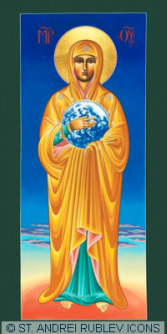 Also, if you want to pray with an icon which depicts a saint with beautiful stars, go to http://www.standreirublevicons.com/gallery.php?action=viewPicture&id=372 for Fr. William Hart McNichols' icon of St. Rose of Lima. Or you can go to http://www.standreirublevicons.com/gallery.php?action=viewPicture&id=323 for Mary Most Holy, Mother of all Nations, which is depicted to the left. This is also an icon written by Fr. William Hart McNichols. Prints of these are available for purchase at the website www.fatherbill.org which is the main page for all Fr. Bill's icons. 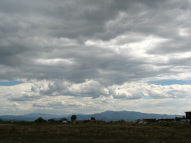 Just recently my husband and I took a short vacation which included a visit to a dear friend. Just as everyone who goes on vacation discovers, time seems to flow differently when we are outside of the usual routine of our daily lives. This trip was especially freeing in that respect and so I began to reflect about time and how much we relinquish when we let time be our taskmaster. In one town during our trip, I saw that people seemed to be on their own kind of time. If a shop said "Open at 10" it may not have opened until 10:20. Strangely, that did not bother me the way it would have in my big city life when I absolutely, positively have to have something done at this moment so that I can move onto the next "absolutely, positively I have to do it now" moment. I am a very punctual person, so I was surprised when I actually did not mind when people sort of meandered to a meeting, or showed up whenever they got there, (all within reason, I admit). I enjoyed it because it freed me of my need to constantly watch the clock. I began to realize that to some degree we are all slaves to that. But it does not have to be that way. While I know that we do need to have a schedule given work, keeping up with our children, appointments, and the like, I think it does give rise to some thought about the frenetic cycle in which we can find ourselves. Surely we cannot simply mosey into all our appointments whenever we feel like it; it would throw the other person's schedule off, thus adding to their own stress. And it would be rude and self-centered. The point here is not to be insensitive. Rather, it is to allow our time to have more meaning. We can still be busy and we still can (and should) honor our commitments, but it is important to realize that our lives can fly by in what seems to be an instant. Therefore it is important to be attentive to each moment and not see certain times as filler, or wasted, or simply something to get us to what really matters. Simply put, it is not how busy we are that should rule our minds and hearts; it is how we use the time we have, busy or otherwise. It is about our attitude. Are we slaves to the clock, or do allow the time we have to be a gift? I have witnessed through my ministry of directing retreats that while on a retreat we begin to let go of the need to manage time. Whether on a group retreat or private directed retreat we usually have to be on time only for a presentation, meal, prayer service, or our once daily meeting with the retreat director. The rest is our time with God. So while we still have to be somewhere at certain times, there is less demand and more of a sense of letting go of the hectic pace at which we normally live our lives. It is a surrendering to God's time. In this surrender is actually great freedom. Often at the end of a retreat I will hear people say with a bit of a sigh that they loved it, but "now it is time to get back into the real world." I know what they mean, but really the retreat was the real world insofar as it was time alone with God without any demands and without all the rushing around. What it reminds us of is that while on retreat we really are on God's time, or kairos, rather than being a slave to the clock and chronological time, chronos. It is a taste of things to come...and we like it! Any time we go to prayer we step out of chronos and into kairos. Or at least if we really want to find the peace that prayer and meditation bring, we need to surrender the distraction of the clock and simply be with the Lord. It is good not just for the soul, but also for our minds and bodies. It relieves stress, and that has been proven scientifically. Of course, any time we spend time with God, whether it is a time of trouble or a time of joy (or something in between), it is a stress reliever because we are handing it all over to the Lord. Anything difficult when shared is easier to bear, and that which is a joy is more wonderful when someone else is invited into it. Any time we go to a worship service we step out of our slavery to the clock, or at least we should. I hate to admit it, but sometimes I am a bit grateful that I need reading glasses in order to see my watch now. This is because it helps me resist the temptation to look at it during Mass. I really cannot see the hands without my glasses, so I have little choice even if I do try to sneak a peek. I am a product of my culture, so admittedly I have given into this on many occasions. But now I feel more and more freed from this tendency. Not being able to read my watch is helping me break the habit of caring about how much time it takes. You see, deep down, it really does not matter how much time it takes because it is about worship and it is about being fed spiritually. Why would I want to limit that time? What else "out there" is more important than time with God? It is the one time in my week when nothing is demanded of me and it is time to be with my “faith family” and the Lord who is present there. (In Matthew 18:20 Jesus said: "Where two or three are gathered together in my name, there am I in the midst of them.") Therefore while it is a real struggle and a temptation for those of us conditioned by the clock, it really is very freeing when we can simply let go of our slavery to it during our time of worship. If we truly want to be present to the people who matter most to us, it is important to truly be attentive to each moment we are together, savoring it and being mindful in it. If we are attentive to those we are with, including our times with God, each moment has much more meaning and much more beauty. No one likes to be in the presence of a person who they know is not really listening. Rather than crossing off every encounter from the "to-do" list, going through life like it is one long grocery list, we need to savor each moment; once that moment passes we never have it again. When we are mindful and focused in the moment, there is so much more to see and hear and experience. The world opens up and we have more time to let our thoughts and feelings register, rather than being a blur in our memory, if we can even remember it at all! It allows us to see beyond the surface of everything. It allows us to enjoy the time with loved ones more, and even to learn more from the times of pain and suffering. And from this flows gratitude. Slowing down and really being present, even with a hectic schedule, is something we can learn to do with a little practice. Even if we are on the run with so much that has to be done by a deadline, letting our attitude be transformed by grace will enable us to get it all done, but without it stressing the living daylights out of us. A good example here is of Pope John XXIII. He would arise at 4 AM so he could have an hour of prayer before his early Mass. Someone once asked how he could do that when he had such a busy schedule ahead of him every day. His response was that it was precisely because of that schedule that he needed that time with God. It allowed him greater freedom from the "demands" of the clock and it gave him the strength of the grace he knew he needed to carry out so difficult a mission as being pope. Let us be like Pope John XXIII, recognizing the need to spend some time, God's time, in prayer so that we can have the grace to deal with our daily tasks. Let us ask for the gift of being mindful and focused with the ones we are with so as not to be caught up in time but in the actual encounter. Let us ask for the gift to truly live more mindful of God's time in those opportunities when it is offered to us, such as Sunday worship. Let us ask for the ability to let go of the stress that the clock can put upon us. And let us be filled with gratitude for the freedom which comes from accepting the gift of God's time. Let us continue to meet in the Heart of Jesus, where there is nothing but God's time. Peace! (This is dedicated to a special friend for whom my time was intended, but got away from me this week. I am still learning!) 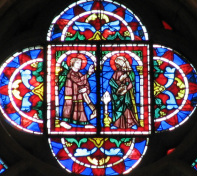 “The Lord your God, is in your midst, a mighty savior; He will rejoice over you with gladness, and renew you in his love, He will sing joyfully because of you, as one sings at festivals.” (Zeph. 3:17) There is nothing that says more about love than the ability to forgive and be forgiven. It is the very heart of the death and resurrection of Jesus. He died to save us from the power of sin and death, an act of forgiveness and reconciliation born of His deep love for each and every one of us. To forgive is the greatest act of love that anyone can give. It frees both the offender and the one who has been hurt. It frees us from the weight of the burden of hurt or guilt or whatever it is that keeps us apart, especially that which keeps us distant from God. It is the most difficult act of love to give, therefore it is the greatest. Forgiveness is the heart of love. There is much to be said about forgiveness, but I will share only a few thoughts about it. When we are hurt or betrayed it is so difficult to forgive the one who hurt us. Therefore it is important to realize that we need to be ready to forgive. If we say we forgive the other too soon, we may have said the words while still being in bondage to our feelings of hurt and betrayal. Sometimes we need to begin by praying for the desire to forgive before we try to actually forgive. On the other hand, we do not want to hold onto a hurt for so long that we cling to it, not wanting to let go at all! It takes more energy to be angry and hurt than we realize; it colors everything we do when we hold onto anger. It is like swallowing a live hand grenade: it will not take much of a jostle for it to go off and for the explosion to be with an innocent person who has nothing to do with the original hurt. It is important for us to turn to the Lord and ask Him to help with our pain and hurt when we need to forgive. Quite often we try to handle it ourselves and discover we simply cannot let go. If we let Him help us we can gradually let grace soften our hearts, heal our wounds, and give us the strength to face the one who hurt us and say "I forgive you." When we do this, we discover that the ones who are most released are ourselves. I realize that not all hurts are as easy to forgive as others, but forgiveness is part of loving, and it is what will set us all free. Loving does not always mean liking, and it does not mean we condone what was done. But it is essential to being loving. The word in the New Testament for this heroic love is agapè, (ah-gah-pay). Agapè is defined as unconditional love; loving those who are hardest to love; loving the way God loves us. Jesus taught that this is perfect love and that we should aspire to it. However, we need His help to love this way. Therefore God gives us the grace to love with agapè when we need it or ask for it. This kind of love is expressed in deed, not just in word. He made it clear that it does not mean we have to like everyone we meet since that is impossible. But we are to respond to them lovingly. We often paraphrase His teaching with the saying: "Love the sinner, hate the sin." This kind of love originates in the Old Testament law in which we were instructed to love the poor, the widow, the orphan, and the alien in our midst. Clearly it is not about liking everyone and agreeing with everything. It is about doing the right thing, the charitable thing, the loving thing. And this is often somewhat difficult. But with His help we can do it. There are times when we need to be the ones who seek forgiveness from another person and God. Further, we need to allow ourselves to be forgiven. Sometimes it can be harder to forgive ourselves or to accept forgiveness from others for our transgressions than it is to forgive others. The Good News is that forgiveness is already waiting for us. God will never withhold forgiveness from us if we are truly sorry. In fact, if we ask for help in whatever area of weakness we have, God will give us that, too. It does not surprise me that Jesus left us the Sacrament of Reconciliation, since God has been forgiving us since the day people first sinned and will do so if we seek it until the end of time. One of my favorite passages in the Old Testament is contained in the writings of the prophet Zephaniah, one of the Minor Prophets. (There are many passages about how God offered to forgive His very wayward children in the prophetic books.) The people had betrayed God terribly. He had warned them of what would happen to them should they cast Him aside. It was not that He wanted to punish them. It was that if they rejected Him, He could do nothing to help them because He does not force Himself on His people ever. The people did not listen and the worst had happened. As always, they learned a tough lesson and began to beg forgiveness. Zephaniah was writing at a time when they were just out of exile. This is what God said through Zephaniah: "Shout for joy, O daughter Zion! sing joyfully, O Israel! Be glad and exult with all your heart, O daughter Jerusalem! The Lord has removed the judgment against you, he has turned away your enemies; The King of Israel, the Lord, is in your midst, you have no further misfortune to fear. On that day, it shall be said to Jerusalem: Fear not, O Zion, be not discouraged! The Lord, your God, is in your midst, a mighty savior; He will rejoice over you with gladness, and renew you in his love, He will sing joyfully because of you, as one sings at festivals... At that time I will bring you home and at that time I will gather you." (The entire passage is Zeph. 3:14-20.) God was forgiving them! He was calling His sinful, but atoning, people back to Himself. If you read the whole Old Testament up to this point, you will see that the people had rejected God time after time after time. And yet rather than abandoning them and finding a new people, He forgave them over and over. Jesus taught that same message, especially when He told Peter to forgive “70 x 7” times; in other words, do not stop forgiving. What I love most about the passage from Zephaniah is that God did not just say He forgave them. He said He would sing joyfully over them as one sings at festivals! God was overjoyed that He forgave them and that they accepted it! I love the image of God rejoicing to the point of singing and dancing! And He wanted them to share in it, too: "Shout for joy, O daughter Zion!" "Be glad and exult with all your heart!" Forgiveness is something for which to be grateful. That God has forgiven us and will continue to do so is a gift beyond measure. Better still, He enables us to give that gift, too. Jesus said: "What you have received, give as a gift." I believe that is true of many things, but especially about the type of love it takes to forgive. We have received it, so let us give the gift of forgiveness when we can. We can rejoice at the freedom forgiveness gives. May we be empowered with the courage to forgive those who have hurt us. May we accept the grace to forgive ourselves when we have failed. May we be enabled to accept the gift of forgiveness from the Lord. And may we rejoice and shout for joy, exulting with all our heart at the great gift of love offered to us by our God. Let us meet in the Heart of our singing and dancing God. Peace! Some links to excellent resources about forgiveness: Left to Tell and Led By Faith, are both books by Immaculee Ilibagiza. She hid for over 90 days in a tiny bathroom with 7 other women during the Rwandan genocide in the early 1990's. Her witness to the power of forgiveness is one of the most amazing examples I have ever read. A song I like is Matthew West's new song, Forgiveness. West said that this song was inspired by a story of a woman who forgave a drunken driver who took the life of her daughter. She said forgiving him gave her great freedom. http://www.youtube.com/watch?v=h1Lu5udXEZI  Recently I was at a Baptism at my church and I spent a little time reflecting on the beauty of the ritual. Baptism is the beginning of our true life in Christ and in His Body, the Church. It is an incredible gift, as is any sacrament, but the gift is made on our behalf. We can see that if an infant is being baptized, the gift is made available by the baby's parents who are standing in for that child who is too young to say his or her own "Amen." Actually the gift is neither being given by their parents or the priest or deacon. It is being given by God who loves us so much that He wants us to be connected to Him by the graces of Baptism as soon as we can. But it is the love of the parents (and godparents) that enables this to be given to the child. It is their love that passes this on because they have brought their child to the community in order for this gift to be bestowed. God wants to offer this gift because He wants us to have what is best in life: His very self, given in love forever. And parents want their children to have it for the same reason. They want their children to have the very best: nothing less than salvation. Through Baptism we receive many gifts which open us to this life with God. Most prominent are the cleansing of original sin and the graces of faith, hope, and love. We also receive the connection to the entire Body of Christ, living and already in Heaven. We receive the connection to the Church here on earth, the body of believers who will support us in difficulty and cheer us on in times of joy, and whom we will also serve in this way. But what really struck me as I reflected on the gift of Baptism is that once it is given, we can never lose it. God makes an incredible covenant of love with us when we are baptized which is indelible and can never be lost, stolen, damaged, or destroyed. We do not need to take out insurance on it, though we do need to feed it with a steady diet of Scripture, prayer, and a sincere effort to love Him back. God does not force His grace on us, but we need to cooperate with it by doing our best to let this gift of Baptism grow. It is indeed the gift that keeps on giving. What I wanted to touch upon, however, is the love with which God loves us that enables us to have this great gift. From the very beginning of the Old Testament, from the beginning of creation, God wanted to be in a covenant of intimacy and love with us. He made us out of love, giving us His very breath, forming us out of the clay with His hands. Immediately after He created man and woman He gave us everything that He made. He made it clear in the very first covenant with Noah that it was all for us; it was clear that we have a responsibility to care for everything, but He would give us all we need in order to do that. He made covenant after covenant, but all of them were broken by His people. However, what is nearly impossible to comprehend is that God never broke His promises and renewed that covenant with an unfaithful and weak people again and again. We may be weak and often unfaithful, but we are His people! Finally He sent His Son, Jesus, and made Him the ultimate covenant, a covenant sealed in His own body and blood. And from the gift of Jesus' body and blood flow all the other sacraments and graces. Jesus began His ministry by being baptized as a way to emphasize for us just how important this sacrament is. Baptism joins us to God in an unbreakable covenant which is fed by the other sacraments, especially the Eucharist. That great gift keeps us bonded to Him, unless we decide to reject it, and there is no power in the heavens or on earth that can break that bond. The bond is the bond of love. Love is what keeps us all connected to one another and to God. St. John tells us that God is love, (1 John 4:7 and following) so the bond is God's very own self. No wonder St. Thérèse of Lisieux was led to exclaim that her vocation was love. She realized that even if we cannot do some things well or at all, and even if there is always someone better at doing the things we can do, we can all love. How wise she was! She realized that it was about the quality of our love, not the quantity or even the quality of our output. She realized that at Baptism she was given the gift of love and knew that she was called to a radical living of that love. And isn't any true living out of the vocation to love radical? If we truly love, putting the other person or persons before us, is that not radical? If we truly serve others, going the extra mile, loving the one who is difficult, being kind to the stranger, giving from our great or small means to those whose means are smaller, forgiving those who have hurt us, is that not radical? True love, the kind of love that Christ lived and calls us to live, is radical. The Good News is that God does not expect us to do this on our own. He gave us the gift of Baptism for us to draw upon so that we never run out of the store of love, because He is the endless store-house. To use Jesus’ own example, God is the well of Living Water that never runs dry. So when our store of love seems to be dwindling in a difficult time or a time of loneliness, or we find that the well feels like it is running dry, we can turn to the graces of Baptism, the gentle cords of which are our bond to Him, and we will find the unending grace of love right there, already in our hearts. And that is also true of faith and hope and all of the other graces we receive from Him. All we need to do is ask and He will give us what we need in order for us to love, connected to Him throughout our lives and then forever in Heaven. Today let us be glad for the gift of the Baptism we received no matter what age we were when we received it. In gratitude, let us re-commit to the gifts of faith, hope, and love by giving ourselves to the Lord each day as we try to share the gifts given to us with others. Let us truly embrace our vocation as a vocation of love, so that like St. Thérèse of Lisieux we can exclaim "My vocation is LOVE!" with everything we do. If we are baptized our vocation is love! It is a great gift given to us by the Lord of Love! May we be signs of that love to all we meet and especially those with whom we are closest. Let us continue to meet in the heart of our Lord of Love. Peace!  All pictures my own photography. Both of the photos in this entry were taken in Nova Scotia, Canada. |
Heart Speaks to Heart
|

 RSS Feed
RSS Feed

